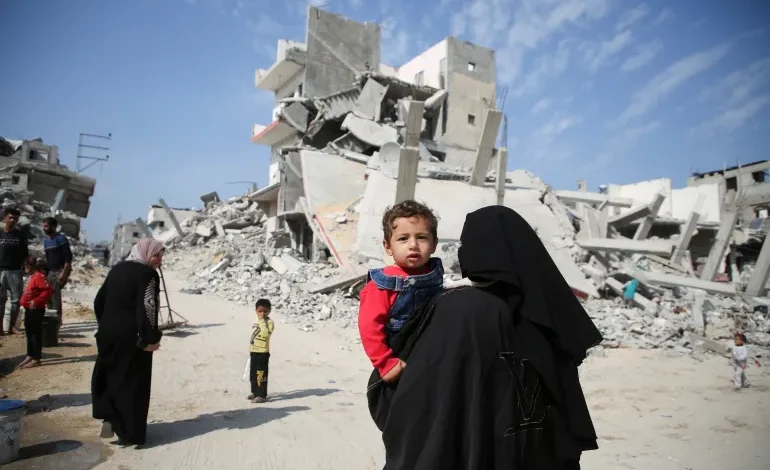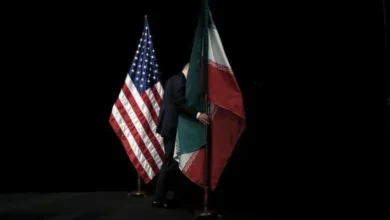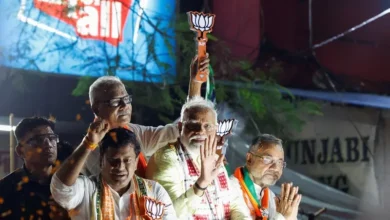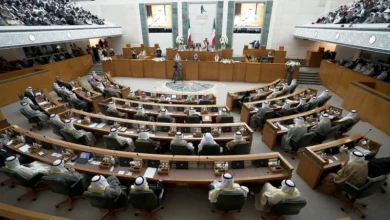Trump 2.0: Will China and Imran Khan test Pakistan ties with the US?

Amid a flurry of congratulatory messages from political leaders worldwide following his victory in the US presidential election, Donald Trump received a message from an unexpected source: Pakistan’s former Prime Minister Imran Khan, his “very good friend” who is currently in jail.
In a brief, 55-word post on his X social media account, Khan congratulated Trump on his win and said the will of the American people “held against all odds”.
“President Elect Trump will be good for Pak-US relations based on mutual respect for democracy and human rights. We hope he will push for peace, human rights, and democracy globally,” Khan’s message read.
The post points to some of the ways in which a deeply divided Pakistan’s relationship with the US under a second Trump presidency could be tested, say analysts.
Will Trump intervene on Khan’s behalf?
While most experts believe Pakistan is unlikely to be a priority for the new administration, Khan’s party, Pakistan Tehreek-e-Insaf (PTI), is hopeful that Trump’s win could ease the political troubles faced by the former prime minister, who just two years ago accused the US, under President Joe Biden, of meddling in Pakistan’s domestic politics to remove him from power.
Former Pakistan president and a senior member of PTI, Arif Alvi, congratulated Trump for his victory, adding that “free and fair” elections allowed “the citizens of America to make their dreams come true”.
“We look forward to continued cooperation as democratic nations. Indeed, your victory must have sent shivers down the spine of dictators and aspiring dictators of the world,” Alvi wrote on platform X.
But Pakistan’s officials appeared confident that the US under Trump would not pressure them for Khan’s release – and laid down Islamabad’s red line on the matter.
“Pakistan and the United States are old friends and partners, and we will continue to pursue our relations on the basis of mutual respect, mutual confidence and noninterference in each other’s domestic affairs,” Pakistan’s Foreign Ministry spokesperson Mumtaz Zahra Baloch told reporters on Thursday.
Joshua White, a former White House official for South Asian affairs under the Obama administration, suggested that engagement with Pakistan will likely be a “low priority” for Trump’s team.
White, now a non-resident fellow at the Brookings Institution, noted that Pakistan is primarily viewed through a counterterrorism lens in Washington, with “little appetite” for renewing a broader security or economic partnership.
“It’s plausible that someone in Trump’s circle might encourage him to address Khan’s case or the PTI’s position more generally,” White told Al Jazeera, “but it is unlikely he would use the US government’s influence to pressure the Pakistani military on this matter.”
After Khan was removed through a parliamentary vote of no confidence in April 2022, he accused the US of colluding with Pakistan’s military to remove him, a claim both Washington and Islamabad deny.
But relations have since warmed gradually between the two nations, with the Biden administration appointing Donald Blome as US ambassador to Pakistan in May 2022, filling a position vacant since August 2018.
Throughout the crackdown on Khan and PTI, including Khan’s imprisonment since August 2023, US authorities have largely refrained from commenting, citing it as an internal matter for Pakistan to resolve.
However, following controversial general elections in February, where the PTI claimed their majority was curtailed through a “mandate theft”, the US stopped short of characterising the election as free and fair.
Congress subsequently held a hearing on the “future of democracy” in Pakistan, spurred by legislators urging President Biden and Secretary of State Antony Blinken to scrutinise the election outcome. In October, more than 60 democratic legislators urged Biden to use Washington’s influence with Pakistan to secure Khan’s release.
Although Trump had criticised Pakistan in his first term, accusing it of providing “nothing but lies and deceit”, he developed a rapport with Khan during the latter’s premiership from 2018 to 2022.
The two first met in Washington in July 2019 and again in Davos in January 2020, where Trump referred to Khan as his “very good friend”. By contrast, relations between Khan and Biden were frosty, with Khan often complaining about Biden never making contact with him.
Just days before the November 5 election, Atif Khan, a senior PTI leader, also met Trump’s daughter-in-law, Lara Trump, to discuss concerns about Khan’s incarceration.
Maleeha Lodhi, a former Pakistani ambassador to the US and the UK, questioned expectations that Trump might intervene on Khan’s behalf.
“While Trump and Khan enjoyed a warm relationship, Pakistan does not figure prominently among US foreign policy priorities,” Lodhi told Al Jazeera. “Relations are at a crossroads and need redefinition, but it’s unclear how interested a Trump administration would be in engaging on this front.”
Will Pakistan matter more – or less – to the US under Trump?
Foreign policy expert Muhammad Faisal added that Pakistan, which had some engagement with the US under Trump due to the Afghanistan conflict, may now receive less attention as the administration grapples with issues like Gaza, Ukraine, and US-China tensions.
“The presidency will be more focused on domestic policy and global trade issues. Pakistan’s domestic politics is not a topic of mutual interest for the incoming Trump administration,” the Sydney-based analyst said.
Still, some see Pakistan’s relevance to US interests potentially increasing if tensions in the Middle East rise, particularly with Iran.










